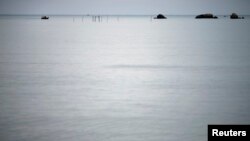Indonesia's move to rename part of the contested South China Sea appears to be a warning to the most powerful maritime claimant, China, that Jakarta intends to step up protection of its own claim without causing a spat for now.
On Friday, a deputy maritime affairs minister in Jakarta said Indonesia would rename a tract of water northwest of the island of Borneo as the “North Natuna Sea,” in line with oil and gas exploration projects with similar titles, according to the Indonesian Antara news service. The renamed tract is near the Natuna Islands, an Indonesian chain of 272 maritime features, and overlaps the southernmost part of China’s so-called “nine-dash line” claim extending from its south coast.
Indonesia exerts authority
The name change may be largely cosmetic, analysts say, but it serves as a warning to China – normally a friend – as well as other countries to keep away.
“I don’t call it a storm in a teacup, but the reality is that China’s fishing boats do come into Indonesian waters on this vague historical claim ‘traditional fishing ground,’ and Indonesia has been pretty adamant in shooing them away,” said Carl Thayer, Southeast Asia-specialized emeritus professor of politics at The University of New South Wales in Australia. “But renaming the waters is not a claim to new territory.”
China reacts
China’s foreign ministry spokesman Geng Shuang said Friday at a briefing that it was “totally meaningless” for any country to change the sea's name. The name "South China Sea" is “widely accepted” by the United Nations and the “international community,” he said.
Officials in Beijing say their nine-dash line follows Chinese fishing patterns over the centuries and cite records dating back some 2,000 years. But in July 2016, a world arbitration court ruled that China lacked a legal basis for its claim.
Indonesia’s move follows name changes by Vietnam and the Philippines involving parts of the same sea, also contested by China, off their own coastlines. Brunei, Malaysia and Taiwan have claims, as well, to the 3.5 million-square-kilometer tropical body of water that’s prized for fish, fuel exploration and commercial shipping lanes. China says more than 90 percent of it falls under its flag.
Debate over impact
Name changes seldom make much impact, said Le Hong Hiep, a research fellow with ISEAS Yusof Ishak Institute in Singapore.
“Various countries in the region have called the sea differently, but I think it’s not something too special, something that will cause objection among other Asian countries,” Le said.
But Euan Graham, international security director with the Lowy Institute for International Policy in Sydney, said the move does have symbolic value.
“I think it is more significant, it’s not just a cosmetic, nationalist re-branding,” Graham said. “I do think we are seeing a kind of subtle, coordinated implementation, post-award. If you connect the dots, China I think will receive the message that Southeast Asia has not rolled over in the way that it might have hoped and expected.”
Incidents leading to the name change
China has irked Indonesia by passing vessels through waters Jakarta calls its own. Other countries along the sea resent China’s landfilling larger islets for construction of military facilities capable of supporting combat aircraft and radar systems.
“We can see this effort by Indonesia is also part of the regional response to China’s recent assertiveness in the South China Sea, because to some people, especially China, when the sea is called the 'South China Sea,' it naturally entitles China some rights, which is false,” Le said.
Last year Indonesia said it would step up patrols against foreign vessels in waters near its 13,000 islands. In March 2016, China and Indonesia entered a standoff when Indonesian authorities tried to stop a vessel and a Chinese coast guard vessel intervened. That month Indonesia said China had officially included waters near the Natuna Islands on a Chinese territorial map.
In May 2016, the navy arrested a Chinese fishing vessel despite Beijing’s coast guard backup. A month later the navy fired on another Chinese boat, possibly injuring a sailor, before impounding it and jailing the seven-person crew.
But Indonesia lacks the military might to resist China in a sustained conflict. At the same time, China is Indonesia’s top import source and second biggest export destination for items such as minerals and palm oil, muting Jakarta’s criticism of Beijing over the years and vice versa.
Trade and nationalism
Indonesian President Joko Widodo, widely known as Jokowi, has called on the two countries to raise two-way trade to $150 billion by 2020.
But Jokowi occasionally plays a “nationalist card” anyway, said Graham, adding the president’s view is “very much framed by sovereignty” and he doesn’t want another country to use parts of the sea that it claims.
“I am sure that Indonesia's move will also be viewed by other Association of Southeast Asian Nation members as 'encouragement' on how to deal with China in this regional dispute,” said I Made Andi Arsana, geodetic engineering lecturer at Universitas Gadjah Mada in Yogakarta.
“[Jakarta] wanted to bring awareness to the international community that political geography of the world is changing and it invites the world to make a new consensus," he said.
Krithika Varagur in Jakarta contributed to this report.




